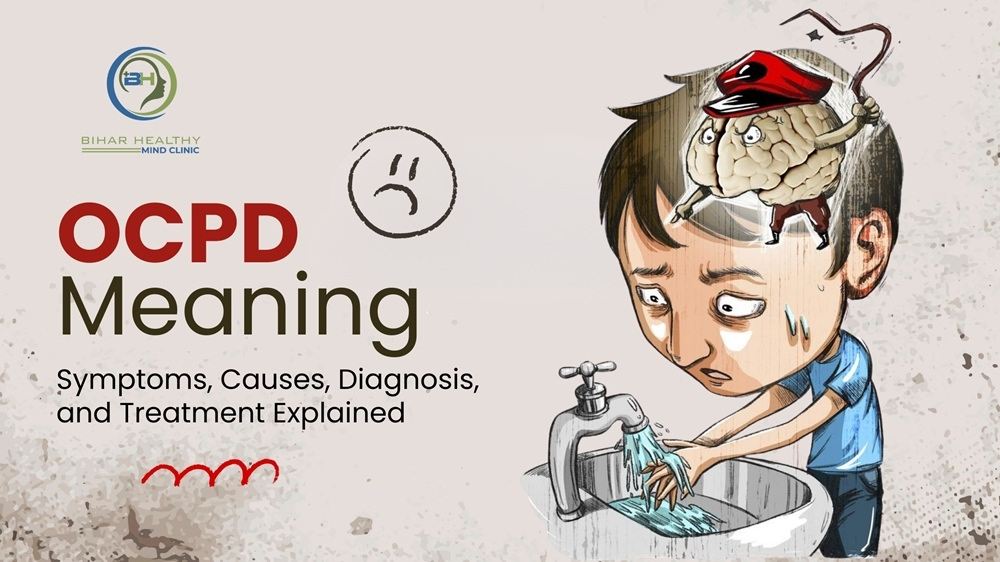
When discussing mental health, personality disorders often raise confusion due to their overlapping symptoms with other psychiatric conditions. One such condition is Obsessive-Compulsive Personality Disorder (OCPD), also known as anankastic personality disorder. Many people often confuse it with Obsessive-Compulsive Disorder (OCD), though both conditions are different. In this blog, we will explore OCPD meaning, its causes, symptoms, diagnosis, and treatment options. At Patna Psychiatry, under the guidance of Dr. Saurabh Kumar, MD (Psychiatry), patients receive comprehensive evaluation and treatment for OCPD and other personality disorders.
What is OCPD?
OCPD stands for Obsessive-Compulsive Personality Disorder. It is a long-term disorder where individuals show a rigid tendency toward perfectionism, extreme orderliness, and control. Unlike OCD, which involves intrusive thoughts and repetitive behaviors, OCPD personality disorder focuses more on a person’s enduring personality traits. People with this disorder often find it hard to relax, delegate tasks, or accept flexibility.
In psychiatry, OCPD is categorized under Cluster C personality disorders, which are primarily characterized by anxious and fearful thinking. It is sometimes referred to as anankastic personality disorder, especially in European diagnostic systems.
OCPD vs OCD Personality Disorder
-
Even though the terms appear similar, they represent distinctly different conditions:
- OCPD (Obsessive-Compulsive Personality Disorder): A lasting personality pattern marked by perfectionism, excessive control, and a strong focus on rules.
- Obsessive-Compulsive Disorder (OCD): A clinical condition where individuals perform repetitive behaviors or mental acts to reduce anxiety caused by unwanted intrusive thoughts.
Understanding these distinctions is crucial because treatment approaches differ significantly.
Symptoms and Characteristics of OCPD
The characteristics of obsessive personality disorder are often subtle but become more apparent in relationships, workplaces, and daily life.
-
Common symptoms include:
- Perfectionism: Unrealistic standards for self and others.
- Attention to Details: Strong fixation on rules, schedules, and lists.
- Inflexibility: Difficulty adapting to new situations.
- Overwork: Excessive devotion to work at the cost of leisure and relationships.
- Reluctance to Delegate: Difficulty trusting others with tasks.
- Stubbornness: Strong need for control and rigid thinking.
- Miserliness: Unwillingness to spend money, often saving for future uncertainties.
These traits often cause conflict in personal and professional relationships, as individuals with OCPD expect others to follow their standards strictly.
Causes and Risk Factors
The exact causes of OCPD are still under research, but psychiatry suggests a combination of factors, including:
- Genetic Influence: A family history of psychiatric illnesses or personality-related disorders.
- Childhood Environment: Growing up in highly controlled or overly disciplined households.
- Personality Traits: Inborn tendencies toward orderliness and conscientiousness that become extreme.
- Biological Factors: Imbalances in brain chemistry linked to control and anxiety.
OCPD and Other Disorders
-
OCPD often overlaps with or coexists with other conditions such as:
- BPD and OCPD (Borderline Personality Disorder & OCPD): While BPD is marked by emotional instability, OCPD emphasizes control and rigidity. Both can coexist, complicating diagnosis.
- Depression and Anxiety Disorders: Many patients with OCPD also experience mood disturbances.
- Obsessive Personality Disorder Traits in OCD Patients: Though different, both disorders can occur together in rare cases.
Diagnosis of OCPD Personality Disorder
Psychiatrists diagnose OCPD personality disorder using structured interviews, psychological assessments, and the criteria outlined in the DSM-5 (Diagnostic and Statistical Manual of Mental Disorders). Diagnosis involves evaluating persistent behavior patterns, ruling out other psychiatric conditions, and understanding the impact of symptoms on daily functioning.
It’s important to note that individuals with OCPD often do not see their behavior as problematic. Many seek psychiatric help only when conflicts in relationships or workplaces become severe.
OCPD Treatment Options
While OCPD can be challenging, effective treatments exist. At Patna Psychiatry, Dr. Saurabh Kumar provides personalized approaches to address this disorder. Common treatments include:
-
Psychotherapy (Primary Approach):
- Cognitive Behavioral Therapy (CBT): Helps challenge rigid thought patterns.
- Psychodynamic Therapy: Explores early experiences shaping personality traits.
- Schema Therapy: Focuses on breaking unhelpful belief systems.
-
Medications:
- While no specific drug cures OCPD, medications like SSRIs (Selective Serotonin Reuptake Inhibitors) can help reduce associated anxiety or depression.
-
Lifestyle Modifications:
- Encouraging flexibility, practicing mindfulness, and engaging in healthy relationships are crucial for long-term management.
Living with OCPD
OCPD is not just a diagnosis; it affects every aspect of life. While individuals may be highly productive and successful in structured environments, their rigidity often impacts relationships. With the right support, however, they can learn to balance their strengths with more adaptive behaviors.
Family therapy and psychoeducation also play an important role in helping loved ones understand the condition better.
Why Choose Patna Psychiatry for OCPD Treatment?
At Patna Psychiatry, patients receive holistic care that addresses both symptoms and underlying causes of anankastic personality disorder.Dr. Saurabh Kumar, recognized as the Best psychiatrist in Patna, provides compassionate, evidence-based care tailored to individual needs. Whether it’s therapy, medication, or lifestyle guidance, patients are supported at every step of recovery.
Conclusion
Understanding OCPD meaning helps in distinguishing it from similar disorders like OCD. It is a long-term personality disorder that can significantly impact personal, social, and professional life if left untreated. With accurate diagnosis and proper OCPD treatment, individuals can lead balanced and fulfilling lives. If you or someone you know shows signs of obsessive personality disorder, seeking professional guidance is the first step toward improvement.
At Patna Psychiatry, under the expertise of Dr. Saurabh Kumar, patients are assured of comprehensive psychiatric care for OCPD and other mental health challenges.
Disclaimer: All characters and events depicted in this blog are entirely fictional. Any resemblance to actual persons, living or dead, is purely coincidental. The content is intended for informational purposes only and should not be considered as medical advice. Always consult a qualified healthcare professional for medical concerns.
Visitors: 114





No comments yet.